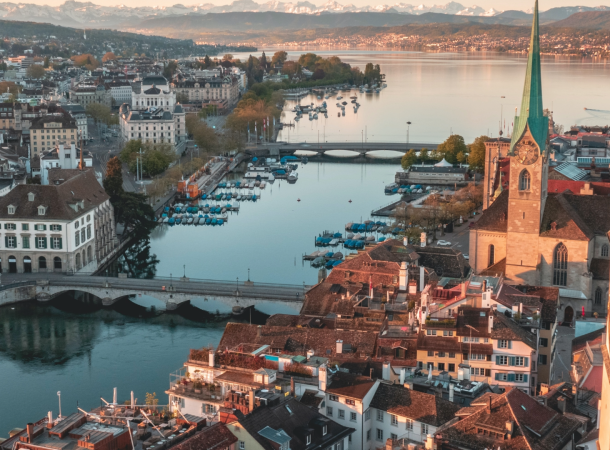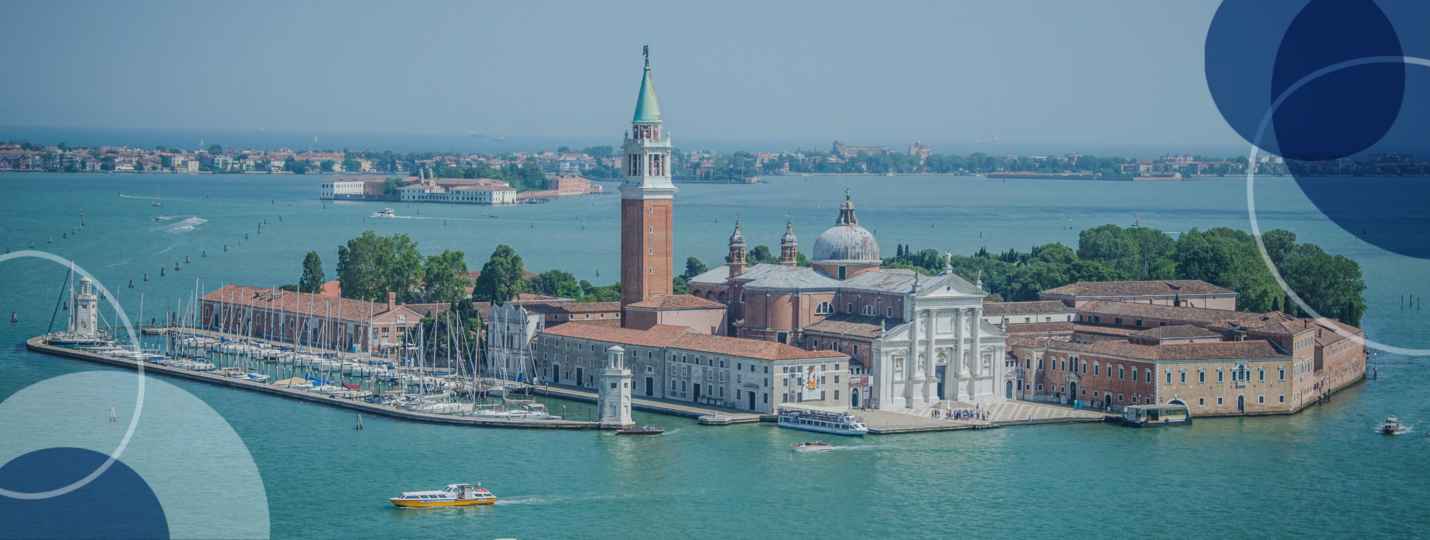
Cheapest Countries in Europe 2024
It’s no secret that Europe is a beautiful continent, rich in culture and history. From the stunning beaches of Portugal to the snow-capped mountains of Switzerland, it is home to some of the most iconic and desirable travel destinations in the world. However, it’s also known for being one of the most expensive regions to live in. But what if we told you that there are countries in Europe where you can live comfortably on a shoestring budget?
This article will take you on a journey through the cheapest countries in Europe, where your money can go further than you ever imagined. Whether you’re a digital nomad looking for an affordable place to base yourself, a retiree seeking a slower pace of life, or just someone who wants to explore new horizons without spending a fortune, you’ll find the information you need right here. To get the most out of it, make sure you scroll down till the end for useful tips for living in Europe on a budget.
Let’s explore the cheapest countries in Europe and find out how you can live the European dream without draining your bank account. Get ready to be surprised!
10 Cheapest Countries in Europe
This section lists the cheapest countries in the world that offer breathtaking natural scenery, cultural experiences, and delicious cuisine without breaking the bank. Whether you’re a backpacker, a budget traveler, or simply looking to save some money, these countries offer some of the best value for your travel/relocation budget.
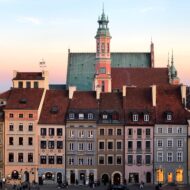
 Poland
Poland
Poland is an Eastern European country with a diverse landscape and rich cultural history.
Poland boasts a strong economy, driven by its skilled workforce and thriving industries such as information technology, manufacturing, and tourism.
Wages in Poland are relatively high compared to other countries in the region, and the cost of living is generally affordable, especially outside major cities like Warsaw and Krakow. The country’s unique blend of modernity and tradition is evident in its architecture, music, and cuisine, which is a blend of Slavic and European influences.
With a strong emphasis on education and innovation, Poland is an attractive destination for students and professionals seeking career opportunities and personal growth. Overall, Poland offers a high quality of life at a reasonable cost, making it an increasingly popular choice for both tourists and expats.
Expense | Cost (USD) |
Cost of living (rent excluded) | $627 |
Rent for a single-bedroom apartment | $515 |
Utilities (electricity, water, gas, internet) | $236 |
Monthly pass for public transportation | $26 |
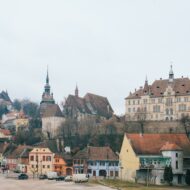
 Romania
Romania
Romania’s economy is diversified, with a focus on manufacturing, IT, agriculture, and tourism. The country has seen steady economic growth in recent years, with a relatively low unemployment rate. Both the wages and the cost of living are parallelly low in Romania. Low living expenses provide the country with an appeal that lures many people from around the globe seeking to find an affordable home abroad.
With a mix of modern and traditional lifestyles, Romania offers a unique experience to visitors and residents alike. From the bustling capital city of Bucharest to the tranquil countryside, there is something for everyone in Romania.
Expense | Cost (USD) |
Cost of living (rent excluded) | $572 |
Rent for a single-bedroom apartment | $280 |
Utilities (electricity, water, gas, internet) | $150 |
Monthly pass for public transportation | $18 |

 Albania
Albania
With a population of over 2.8 million, Albania is a diverse country with a mix of cultures and traditions. Its economy has grown rapidly in recent years, driven mostly by tourism, agriculture, and energy industries. The country has a relatively low cost of living, making it an attractive destination for travelers and expats alike. The average salary in Albania is lower compared to Western countries, but so is the cost of goods and services.
The cost of housing and groceries in Albania is significantly lower than in many other European countries. For example, the monthly rent of a one-bedroom apartment in the city center can cost around 200-300 euros. Food prices are also relatively low, with fresh produce and local specialties being particularly affordable. However, prices for imported goods can be considerably high, and some luxury items may be more expensive than in other countries. Public transportation and utility costs are also relatively low, making Albania an affordable destination for those seeking to enjoy the country’s natural beauty and cultural attractions without getting financially challenged.
Expense | Cost (USD) |
Cost of living (rent excluded) | $525 |
Rent for a single-bedroom apartment | $357 |
Utilities (electricity, water, gas, internet) | $108 |
Monthly pass for public transportation | $16 |

 Serbia
Serbia
Serbia is a country in Southeast Europe that boasts an impressive mix of architectural styles, from ancient Roman ruins to ornate Orthodox churches.
Serbia’s economy is based on agriculture for the most part, with a focus on wheat, corn, and sunflower production, as well as on mining and heavy industry. Although the average wage in Serbia is relatively low compared to Western Europe, the cost of living is also significantly lower, making it an affordable destination for those looking to live abroad.
The cost of accommodation, food, and transportation is generally lower than in most neighboring countries. One can find a range of budget-friendly housing options, as well as luxury accommodations.
The country offers a diverse cuisine, with plenty of affordable street food options and restaurants serving traditional Serbian dishes. Transportation costs are also conveniently priced, with efficient and inexpensive public transport systems available in major cities. The overall cost of living varies depending on one’s lifestyle but it’s reasonably low in general, making Serbia a budget-friendly destination for those seeking to explore the country without breaking the bank.
Expense | Cost (USD) |
Cost of living (rent excluded) | $555 |
Rent for a single-bedroom apartment | $293 |
Utilities (electricity, water, gas, internet) | $167 |
Monthly pass for public transportation | $30 |
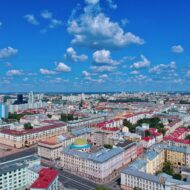
 Belarus
Belarus
Despite its small size, it is culturally prosperous, with a long history of art, literature, and music. Its people are known for their hospitality and warmth, making it an attractive destination for travelers seeking an authentic cultural experience.
Belarus has a unique political system, with a strong presidential system and a centralized economy. Its economy is heavily dependent on exports, particularly oil, gas, and potash, which makes it vulnerable to external economic shocks. Wages in Belarus are relatively low compared to other European countries, but the cost of living is also much lower, making it an affordable place to live.
One of the unique aspects of Belarus is its architecture, particularly in the capital city of Minsk, where Soviet-era buildings mix with contemporary designs. Belarus is also home to numerous national parks and nature reserves, which eco-tourists and outdoor enthusiasts will love.
Expense | Cost (USD) |
Cost of living (rent excluded) | $520 |
Rent for a single-bedroom apartment | $230 |
Utilities (electricity, water, gas, internet) | $73 |
Monthly pass for public transportation | $18 |

 Moldova
Moldova
With a population of just over 2 million people, it is a hidden gem in the region. Its diverse landscape includes rolling hills, lush vineyards, and picturesque villages, which make it a popular destination for tourists. The capital, Chisinau, is a bustling city with vibrant nightlife, excellent restaurants, and a thriving arts scene.
Despite being one of the poorest countries in Europe, Moldova’s economy is slowly growing, and the country has a promising future. Its main industries are agriculture and manufacturing, and there is a growing tech sector. Despite the low wages in the country, Moldova is an attractive destination for those looking for an affordable lifestyle, offering a low cost of living.
Expense | Cost (USD) |
Cost of living (rent excluded) | $540 |
Rent for a single-bedroom apartment | $306 |
Utilities (electricity, water, gas, internet) | $190 |
Monthly pass for public transportation | $13 |
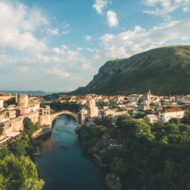
 Bosnia and Herzegovina
Bosnia and Herzegovina
Bosnia and Herzegovina, a country located in the Balkan region of Southeast Europe, is known for its stunning natural landscapes and rich cultural heritage.
Its blend of Ottoman and Austro-Hungarian influences has resulted in a unique cultural identity. The country is also known for its hospitality, with locals welcoming visitors with open arms.
The economy of Bosnia and Herzegovina is largely based on services, with industries such as tourism, banking, and telecommunications contributing significantly to the country’s GDP. The average monthly wage is relatively low compared to other European countries, but so is the cost of living, which makes Bosnia and Herzegovina an affordable destination for those looking to live or travel on a budget. The country is also known for its delicious traditional cuisine, influenced by its Ottoman and Balkan roots.
The cost of living in Bosnia and Herzegovina varies depending on the region, with the capital city of Sarajevo being more expensive than other parts of the country. In general, however, food, transportation, and housing are reasonably priced when compared to other European countries. While salaries are generally lower than in Western Europe, the lower cost of living offsets this to some extent.
Expense | Cost (USD) |
Cost of living (rent excluded) | $543 |
Rent for a single-bedroom apartment | $165 |
Utilities (electricity, water, gas, internet) | $180 |
Monthly pass for public transportation | $30 |

 North Macedonia
North Macedonia
The country’s capital, Skopje, is known for its blend of Ottoman and modern architecture, making for a unique and charming urban experience.
In terms of its economy, North Macedonia has been making steady progress in recent years, with a growing tech industry and increasing foreign investment. Wages are relatively low compared to Western European countries, but so is the cost of living, making it an appealing option for expats and digital nomads looking for affordable living options.
Rent, utilities, and grocery prices are very convenient, and the public transportation system is reliable and inexpensive. North Macedonia is also known for its rich cuisine, which offers an array of flavors and textures, and food is fair-priced.
With friendly locals and a relaxed way of life, North Macedonia is an ideal destination for those looking for a slower pace of life and a truly authentic Balkan experience.
Expense | Cost (USD) |
Cost of living (rent excluded) | $485 |
Rent for a single-bedroom apartment | $230 |
Utilities (electricity, water, gas, internet) | $140 |
Monthly pass for public transportation | $25 |
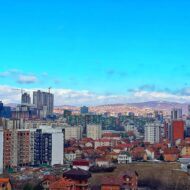
 Kosovo
Kosovo
Kosovo, located in the heart of the Balkans, is a small but fascinating country with a unique cultural blend of Albanian and Serbian influence.
Despite being one of Europe’s youngest nations, Kosovo boasts a prosperous history and a vibrant contemporary culture, with its capital city Pristina serving as a hub for art, music, and nightlife. While the country has faced challenges in recent decades, including conflicts and economic instability, it has made significant progress in rebuilding and developing its infrastructure and economy.
The cost of living in Kosovo is considerably low, making it an ideal destination for those seeking affordable living options. Housing is particularly affordable, with apartments and houses available at reasonable rates in both urban and rural areas. Food and transportation costs are also relatively low, with local markets offering fresh and inexpensive produce, and public transportation being an affordable option for getting around. While salaries in Kosovo are generally lower than in other European countries, the low cost of living can offset this for expats and digital nomads.
Overall, Kosovo offers a cost-effective alternative to other European destinations, allowing individuals to stretch their budgets further while enjoying unique experiences. The country’s economy is mainly based on agriculture, mining, and energy, with a growing tourism industry also contributing to its economic development.
Expense | Cost (USD) |
Cost of living (rent excluded) | $428 |
Rent for a single-bedroom apartment | $312 |
Utilities (electricity, water, gas, internet) | $105 |
Monthly pass for public transportation | $16 |
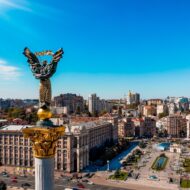
 Ukraine
Ukraine
Ukraine is an Eastern European country known for its diverse culture, rich history, and beautiful landscapes.
With a population of around 43 million people, Ukraine boasts a unique mix of languages, traditions, and lifestyles. The country is also rich in natural resources, such as fertile soil, mineral deposits, and extensive forests.
The cost of living in Ukraine is significantly lower than in many other European countries, making it an attractive destination for budget-conscious travelers and expats. The low cost of living is due to the country’s relatively low wages, which also means that salaries for foreign workers can be very competitive. Housing and utilities are also affordable, with many convenient options for inexpensive apartments and public transportation. While the country may not offer the same level of luxury or amenities as more expensive destinations, its affordability allows for a comfortable and fulfilling lifestyle without breaking the bank.
However, it’s important to note that Ukraine is currently experiencing a conflict with Russia that began in 2022. This conflict has resulted in political and economic instability, as well as ongoing violence in certain regions. Therefore, now may not be a great time to travel or live in Ukraine.
Expense | Cost (USD) |
Cost of living (rent excluded) | $390.1 |
Rent for a single-bedroom apartment | $313.31 |
Utilities (electricity, water, gas, internet) | $90 |
Monthly pass for public transportation | $8.98 |
Tips for Living in Europe on a Budget
1# Choose your destination wisely: Not all European countries are equal in terms of their cost of living. Do your research and choose a destination that fits your budget.
2# Research thoroughly: Before you leave for Europe, do your homework on the country and city where you’ll be staying. Learn about the cost of living, local customs, and the best places to eat, shop, and explore.
3# Plan your budget ahead: A great way to save money while living abroad is to plan your budget in advance.
4# Shop at local markets: Eating out at restaurants can quickly add up, so try to cook at home as much as possible. Shopping at local markets can be a great way to save money on groceries while also experiencing local culture.
5# Use public transportation: Taxis and rental cars can be expensive. Opt for public transportation, such as buses or trains, to get around. Many cities also offer bike-sharing programs, which can be a fun and affordable way to explore.
6# Take advantage of free activities: Europe is full of museums, parks, and other attractions that are free to visit. Take advantage of these opportunities to explore and learn about your new home.
The Wrap-Up and My Take on These Countries
In conclusion, Europe offers a wealth of affordable destinations that cater to budget-conscious adventurers and expats without compromising on the experience.
I’ve had a chance to visit and explore Ukraine, Belarus, Serbia, Albania, and Poland in the above list. I can comfortably say that they all had hidden gems of history, culture, and breathtaking landscapes. The fact that they were cheaper than their Western neighbors did not compromise from the experience.
I was particularly amazed by how affordable I got by in Albania and Serbia, including accommodation, food, transportation, and entertainment. In most of the other ones, I’ve felt that although some aspects were cheap, others were relatively average.
Discovering the magic of Europe without breaking the bank is a reality. So, pack your bags and let these budget-friendly havens unveil their wonders. Happy travels!
Related Articles
Frequently Asked Questions
Is it safe to travel to the cheapest countries in Europe?
Safety concerns can arise in any country, regardless of its economic status. However, many of the cheapest countries in Europe have low crime rates and are safe for travelers. It is important to research the country's safety and travel advisories before planning a trip.
What are some unique experiences I can have in the cheapest European countries?
There are many unique experiences to be had in the cheapest European countries. For instance, you can explore the beautiful Albanian Riviera or visit the ancient city of Berat, known as the "city of a thousand windows." In Romania, you can hike through the Carpathian Mountains or visit the stunning painted monasteries of Bucovina.
In Bosnia and Herzegovina, you can explore the historic city of Mostar and its famous Stari Most bridge or take a dip in the crystal-clear waters of the Kravice Waterfalls. In Moldova, you can visit the world-famous wine cellars of Cricova or explore the mysterious and unique landscape of the Transnistrian region.
Can I live in cheap European countries long-term?
Yes, many people choose to live in cheap countries long-term due to the low cost of living. However, it is important to research visa requirements, job opportunities, and cultural differences before making the move.
What are some factors that make a country cheap to live in?
There are many factors that contribute to a country's overall cost of living, including the local economy, government policies, and cultural norms. In general, countries with lower costs of living tend to have lower prices for goods and services, as well as lower housing costs. Additionally, countries with lower taxes and a lower cost of labor may be able to offer lower prices to consumers.
Are wages in cheap countries also low?
In many cases, yes, wages in cheaper countries are lower than in more expensive countries. However, it's important to note that the cost of living also tends to be lower in these countries, meaning that people may be able to afford a comfortable lifestyle at lower wages. Additionally, some jobs that may pay lower wages in a more expensive country may offer relatively high salaries in a cheaper country.
Is it possible to save money by living in a cheap country?
It is absolutely possible to save money by living in a cheap country! Many people choose to relocate to affordable European countries specifically for this reason. By taking advantage of lower costs for housing, food, and other necessities, individuals and families may be able to stretch their budgets further and save more money each month. Of course, it's important to consider factors like job opportunities and quality of life when deciding whether to relocate to a cheaper country.
How much money should I budget for a trip to one of the cheapest countries in Europe?
The amount of money you should budget for a trip to one of the cheapest countries in Europe depends on several factors, such as the length of your stay, accommodation preferences, transportation choices, and activities you prefer to do. Generally, you can expect to spend less in these countries than in their more expensive counterparts in central Europe. For example, for budget travelers, a daily sum of €30-50 is usually sufficient for food, accommodation, and transportation in countries like Albania, Bosnia and Herzegovina, and Serbia. However, if you plan to engage in more expensive activities like guided tours, outdoor adventures, or fine dining, you should budget accordingly. It's also a good idea to research and compare prices beforehand to ensure you have a realistic budget for your trip.
Are the cheapest countries to live in Europe also the least touristic countries?
No, the cheapest countries to visit in Europe are not necessarily the least touristic countries at all. Many of the countries in the list receive significant numbers of tourists every year and have many attractions, places, and history to offer their visitors.
Country | Cost of Living Index | Country | Cost of Living Index | ||
1 | Ukraine | 25.6 | 23 | Greece | 54.6 |
2 | Kosovo | 28.4 | 24 | Estonia | 54.8 |
3 | North Macedonia | 31.4 | 25 | Italy | 61.3 |
4 | Moldova | 32.3 | 26 | Malta | 61.4 |
5 | Bosnia and Herzegovina | 35.1 | 27 | United Kingdom | 61.5 |
6 | Belarus | 35.4 | 28 | Isle of Man | 61.8 |
7 | Serbia | 37.2 | 29 | Germany | 62.9 |
8 | Albania | 37.4 | 30 | Sweden | 62.9 |
9 | Romania | 37.4 | 31 | Belgium | 65.6 |
10 | Poland | 38.6 | 32 | Austria | 66.0 |
11 | Montenegro | 38.9 | 33 | Finland | 67.5 |
12 | Hungary | 39.2 | 34 | Netherlands | 68.6 |
13 | Bulgaria | 40.5 | 35 | France | 68.7 |
14 | Russia | 40.8 | 36 | Ireland | 70.5 |
15 | Slovakia | 44.2 | 37 | Guernsey | 71.0 |
16 | Portugal | 45.3 | 38 | Luxembourg | 73.2 |
17 | Croatia | 46.7 | 39 | Denmark | 78.6 |
18 | Lithuania | 48.8 | 40 | Jersey | 80.0 |
19 | Czech Republic | 48.9 | 41 | Iceland | 83.3 |
20 | Spain | 50.6 | 42 | Norway | 88.6 |
21 | Slovenia | 50.8 | 43 | Switzerland | 114.2 |
22 | Latvia | 50.9 |
Source of numbers: Numbeo

 Poland
Poland Romania
Romania Albania
Albania Serbia
Serbia Belarus
Belarus Moldova
Moldova Bosnia and Herzegovina
Bosnia and Herzegovina North Macedonia
North Macedonia Kosovo
Kosovo Ukraine
Ukraine









